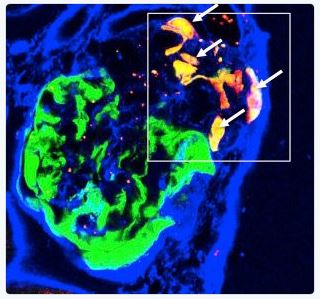Laboratory Research
Divisional faculty continue to advance the understanding of the pathophysiology of kidney diseases with laboratory-based research that is broadly based on studying the role of podocytes in glomerular disease and aging in the kidney (Shankland Lab) and using tissue organoids (Freedman Lab).


Drs. Shankland and Freedman are part of the NIH-funded (Re) Building the Kidney consortium to leverage tissue regeneration as a treatment for kidney diseases. Organoids are an innovative approach to understanding disease pathophysiology, and the current focus at UW is to advance the understanding of polycystic kidney disease and cystinosis, among others.

The Freedman Lab seeks to understand how microscopic events produce macroscopic organs and disease. Our model is the kidney, a beautiful, complex, and vital organ. We use human iPS cell-derived organoids, CRISPR gene editing, and high-throughput screening to guide the development of 21st-century therapies.
Current research areas include polycystic kidney disease, cilia, glomerular disease, COVID-19, diabetic kidney disease, nephropathic cystinosis, and kidney regeneration.

The Shankland Lab is dedicated to investigating glomerular disease at the bedside in order to ultimately benefit patients. In particular, we study kidney regeneration, responses to kidney injury in disease, how potential therapies might impact outcomes at a molecular level, and how aging impacts kidney biology.



